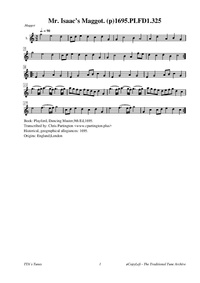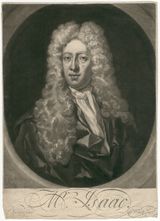Template:Pagina principale/Vetrina

Played by: Auburn Witch
Source: Soundcloud
Image: Mr. Isaac, painted by Louis Goupy. The original portrait is lost, but this engraving of it by George White was published in the early 18th century.

Sixteenth and seventeenth century country dance tunes sometimes had the word "maggot" in their titles, perhaps derived from Italian Maggiolatta or Italian May song, but used in England to mean a whim, fancy, plaything, 'trifle'--essentially an 'earworm'[1].
A maggot was also another name for a dram, a small unit of liquid measure. This anonymous melody dates to 1695, when it first appeared in Playford's Dancing Master, 9th edition. The dance and tune were retained in the long running series through the 18th and last volume, then published by John Young, heir to the Playford publishing concern. It also was included by the Walsh's (father and son) in their Compleat Country Dancing Master, editions of 1718, 1735 and 1754. For more on Isaac see Jennifer Thorp's article "Mr. Isaac, Dancing-Master" in Dance Research - Volume 24, Number 2, Winter 2006, pp. 117-137, where, for example, she gives:
The earliest references to him as a performer in London connect him with the Stuart Court, for in April 1673 a dancer named Isaac was one of several dancers (along with Mr. Priest) who performed as Venetians, a Spaniard, a Conjuror, Devils, and Shepherds, in a masquerade for King Charles II's illegitimate son, the Duke of Monmouth.
A version of "Mr. Isaac's Maggot" has been found included the Suite in C Major[2] by English court composer and recorder player James Paisible (1656-1721) as an "Ornepaipe"
...more at: Mr. Isaac’s Maggot - full Score(s) and Annotations
X: 1 T:Mr. Isaac's Maggot. (p)1695.PLFD1.325 M:3/2 L:1/8 Q:3/4=90 B:Playford, Dancing Master,9th Ed,1695. R:.Maggot O:England;London H:1695. Z:Chris Partington <www.cpartington.plus> K:C V:1 clef=treble name="1." [V:1] g4e4d4|cde2d2c2d2G2|G2c4B2A4|A2d4A2B2G2| g4e4d4|cde2d2c2d2G2|G2c4B2 A2fe|d2c2d2B2c4:| |:E2G4A2G4|E2G4ABc2G2|E2G4A2G4|E2G4ABc2G2| (g3f/g/)(a3g/f/)(g3f/g/)|agfe fedcd2G2|(g3f/g/)(a3g/f/)(g3 f/g/)|\ agfe defgd2c2| e4(f3e/f/)g4|cde2d2c2d2G2|e4(f3 e/f/)g4|G2c2cde2d2c2:|
- ↑ Emmerson (1972) states that maggot derives from the Italian maggioletta, which he translates as a 'plaything', but what his source is for this translation is unknown.
- ↑ A recording of Plaisible's suite has been issued as Arcana Recordings A527, "The Queen's Favourites: Music for Oboe Band at the Court of Anne Stuart", performed by La Petite Ecurie. We are indebted to David Schonfeld for information on this connection.
